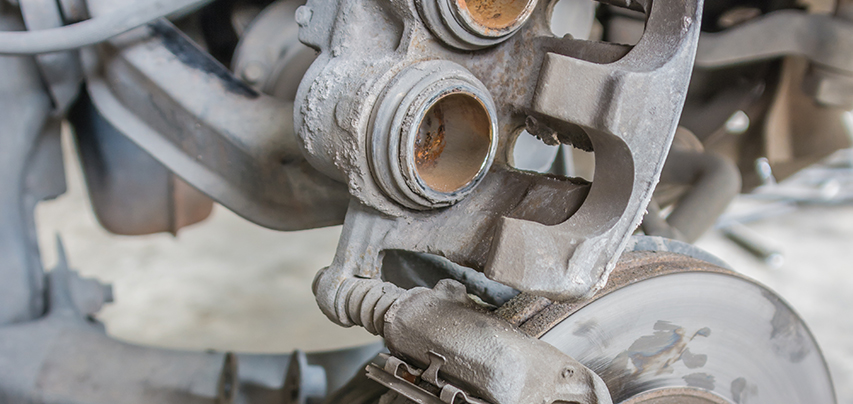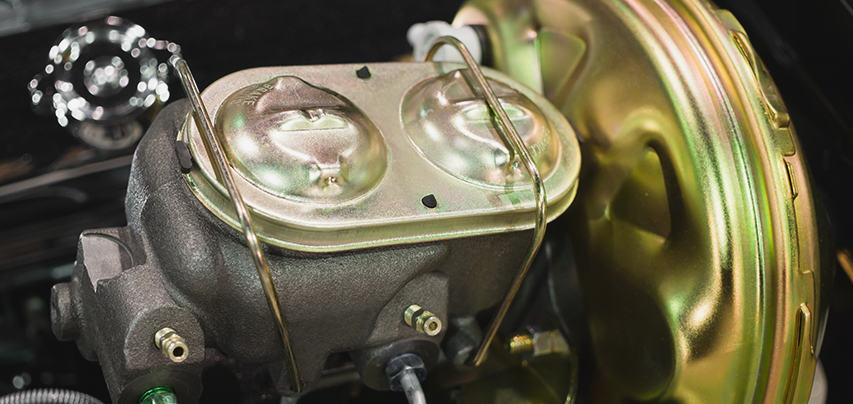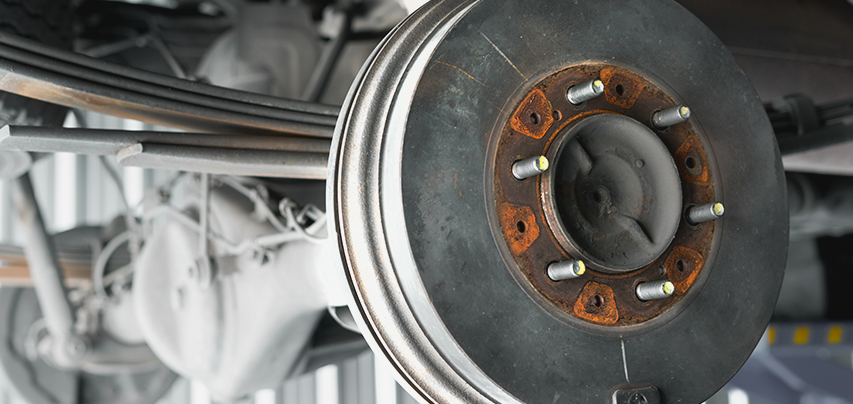Causes of spongy/soft or low brake pedal
There are a number of reasons that could cause your brakes to feel spongy or the brake pedal to travel closer to the floor than usual. If you experience either of these situations, be sure to have your vehicle immediately inspected by your trusted mechanic. They might identify one or more of the following causes that require maintenance.
 Air in the brake line(s)
Air in the brake line(s)
Air in the brake line(s) is the most common cause of a soft/spongy brake pedal. If air gets into the brake lines, it can prevent brake fluid from flowing properly, causing the brake pedal to feel spongy or soft.
If the brakes are soft or spongy, this is a good time to change or flush the brake fluid. Flushing the brake fluid, commonly called bleeding the brakes, gets rid of the air. (Bleeding the brakes uses fluid to push air out of the brake system.) Over time, brake fluid absorbs moisture. Flushing the brake fluid prevents old fluid from boiling, which can cause a low brake pedal. Clean, fresh fluid protects and preserves other brake components such as the master cylinder and ABS (anti-lock brake system) for long, trouble-free operation.
 Damaged/leaking brake line(s)
Damaged/leaking brake line(s)
Since brake lines are made of steel tubing, they can become corroded by rust. Over time, rust can cause small holes to develop, allowing brake fluid to leak out. The loss of brake fluid leads to a loss of hydraulic pressure, so the brake pedal will feel soft or low and go to the floor.

 Leaking disc brake caliper(s)
Leaking disc brake caliper(s)
Like brake lines, disc brake calipers (the component that clamps the brake pad down against the rotors to slow or stop the vehicle) can also become corroded with rust causing the internal piston seal to leak brake fluid. If the caliper is leaking, it can cause the brake pedal to be extremely low or go to the floor. A brake pull may also be experienced if the fluid pressure is reduced at a caliper.
 Worn master cylinder
Worn master cylinder
As the heart of the brake system, the master cylinder performs a number of important functions: it holds the brake fluid, generates hydraulic pressure, and feeds it to the front and rear brakes. Unfortunately, the master cylinder can wear out and develop leaks. There are two types of master cylinder leaks: an external brake fluid leak and an internal leak from a damaged piston seal. Both failures will cause a loss in hydraulic pressure to the brakes which results in the brake pedal failing and going to the floor.

 Leaking wheel cylinder(s)
Leaking wheel cylinder(s)
Some cars come equipped with disc brakes on the front wheels and drum brakes on the rear wheels. Drum brake systems feature a drum that rotates along the wheel. Inside the drum is a set of brake shoes that are forced against the drum by the wheel cylinder pistons. The wheel cylinder pistons move against the shoes from the hydraulic pressure that is generated from the brake pedal being pressed causing the wheel to slow down. Corrosion inside that wheel cylinder can cause brake fluid to leak resulting in a loss of hydraulic pressure. This leads to a low or soft/spongy brake pedal.
 Rear brake shoes adjustment
Rear brake shoes adjustment
If the vehicle has a rear brake drum/shoe and pumping the brake pedal improves the brake pedal, the rear shoes may be out of adjustment. The issue could be that the rear shoes are not being adjusted as they wear. Shoes should be checked for wear and adjusted as needed. Be sure to use the parking brake occasionally as a preventative measure. The engagement of the parking brake causes an automatic adjustment of the brake shoes.

 ABS hydraulic assembly malfunction
ABS hydraulic assembly malfunction
Vehicles equipped with ABS have a hydraulic assembly also called an ABS modulator. This assembly contains multiple internal solenoids and valves. An internal failure, corrosion or debris in the brake fluid can cause a valve not to operate properly, resulting in a low or spongy pedal.
Important note: If you experience a spongy/soft or low brake pedal, have your vehicle inspected immediately by your mechanic.
Learn more about quality brake parts, find your car part, or find where to buy your auto part today.
The content contained in this article is for entertainment and informational purposes only and should not be used in lieu of seeking professional advice from a certified technician or mechanic. We encourage you to consult with a certified technician or mechanic if you have specific questions or concerns relating to any of the topics covered herein. Under no circumstances will we be liable for any loss or damage caused by your reliance on any content.
OTHER PARTS FOR YOUR VEHICLE
Wagner® offers a wide variety of products for all of your automotive needs. Check them out today!